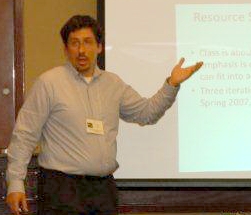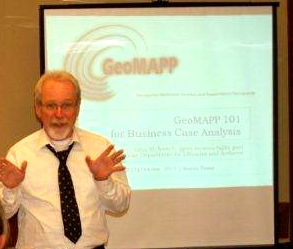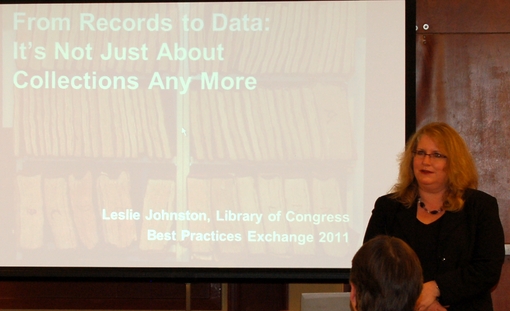The following is a guest post by Erin Engle, Digital Archivist, NDIIPP.
I recently attended the Best Practices Exchange 2011, held October 20-22 in Lexington, KY. The meeting focuses on the work of state archives and libraries to preserve state government digital information, although practitioners from other kinds of memory organizations are welcome. This was the sixth annual meeting, and my second time attending.
BPE is important because it offers an opportunity to share current practices across state lines and to learn from others working on similar issues. The conference also has a history of enabling honest and forthcoming discussions about projects of interest to many different organizations.
Limited institutional budgets were a prevalent base layer for many discussions. State budgets for libraries and archives are among the hardest hit. Continuous cuts to resources (staff, IT systems, travel funds) and “doing more with less” have become an operational norm for many state governments.
My key takeaways focused on three main themes:
Collaboration : From many of the sessions it’s apparent that collaborative partnerships are the right vehicles to address the digital preservation challenges state governments face. In many discussions, attendees agreed that each state building its own digital archive is not feasible or scalable. But collaborations and multi-state activities are viable over the long-term. This enable states with mature archiving systems to work with states who aren’t as far along in addressing their needs. Transferring knowledge, practices and developing approaches for shared services were mentioned as methods moving forward.
Solutions : “What are the tools I can use to help me perform my job?” Individuals are working within their institutions to scale solutions to current challenges, whether they be staff shortages or lack of storage funding. For example, there were small sessions on tools and processes developed to transfer digital materials and to appraise criteria for government electronic records.
Education : There were many discussions surrounding the need to train the existing workforce on digital archiving tools and to train students for the complex issues of managing digital information for government organizations. Not only do archivists and librarians need to understand technical aspects, but they must also also be knowledgeable about public policy issues in managing state records.
In addition to some of the practical tools and solutions practitioners are developing and using, the BPE featured some “big picture” talks from:
- Mike Wash, Chief Information Officer, National Archives and Records Administration. Wash talked about the background, development and future plans for NARA’s Electronic Records Archives System. It was a frank discussion about some lessons learned (“manage your project”) and where we may be headed (“cloud storage is coming”). While some states may have legislative issues to adopting a cloud storage environment, the processes of managing digital content (the ingest, transfer, validation, and authentication components) occurring in the same environment may be beneficial in the future.
- Doug Robinson, Executive Director, NASCIO. Robinson painted a realistic picture of the state CIO landscape. Since 2011, there have been 25 new state CIOs; the average tenure of state CIOs is 21 months. While a recent survey of state CIO’s noted cost savings is the lead motivator for collaboration, introducing new technologies (and potential associated costs) are the lowest goals of state CIOs. Archivists and librarians must keep this this paradox in mind when advocating for e-records and digital preservation programs.
- Vicki Walsh, Executive Director, Council of State Archivists. Walsh asked attendees to come up with some ideas about how to communicate the recommendations of the forthcoming State Electronic Records Initiative survey. Phone interviews were conducted with state electronic records program archivists. Future needs included more storage space and creating functionality in IT systems for ingesting digital records (and accessing them!). These issues can be addressed through still yet to be identified collaborations and partnerships between and among state IT agencies and archives. Archivists and librarians need to advocate, find creative solutions and facilitate those collaborations.
This year’s conference also featured presentations by NDIIPP partners and staff. Leslie Johnston, chief of repository development here at the Library, provided one of the “big picture” talks, noting that researchers are engaging with digital collections in ways we could not have imagined when we developed them. L’Archivista has a nice summary of Leslie’s talk on her blog.
Two sessions focused on NDIIPP’s state government information projects. In a small-group discussion, Cal Lee, of the School of Information and Library Science at the University of North Carolina at Chapel Hill, discussed a forthcoming review report on the four state projects. The report will compare and analyze the approaches each project has taken and the products they have developed. He noted that a common theme among the projects is that progress is tied to specific digital content and format, suggesting that success on digital preservation issues comes through incremental advances. He also touched on the current climate, noting it is important to plan “for sustainability in the face of continuous disruption.”
The final session of the conference featured an informal discussion, led by NDIIPP’s Bill LeFurgy, with representatives of the states projects. Discussions focused on their lessons and ideas were shared on how to continue engagement and/or build on the products developed. Case studies on various topics and tool and services evaluation were suggested as next steps.
On a more personal observation, this year I was a member of the program committee that helped design the agenda. I was thrilled to be part of planning efforts to think about an engaging conference for this community, particularly given the many challenges facing state libraries and archives. It truly is a spirited communities actively looking for common solutions and collaborative means.
Thanks to the Kentucky Department of Library and Archives – they were fantastic hosts!




October 27, 2011 at 10:57 am
This was my first BPE and I thought it was really valuable! It was a great way for me, an archivist at the National Archives, to stay in touch with innovative digital projects happening in the states.
The program and local arrangements were all great – thanks to the organizers for making it all happen!
October 27, 2011 at 11:22 am
Great summary, Erin!
October 27, 2011 at 2:51 pm
We were happy to host a conference that has over the years become one of the best preservation conferences for librarians and archivists. Thanks for your comprehensive and thoughtful summary, Bill and Erin. Lets to it again soon.
October 27, 2011 at 5:18 pm
This was my first BPE also, and what a great event it was. I particularly liked the frank and open discussions that were abundant throughout all sessions. Congrats to Erin and the rest of the program committee for a job well done.
I look forward to next year’s event.
April 5, 2012 at 5:09 pm
Glen or Rob..please help me. I have owned a set of the Ky Birth (1911-1999), Marriage (1973-1999) and Death (1911-1999) Dababase cd’s for many years, and love them.
I recently had to buy a new computer with Windows 7 and upgrade to MS Office 2007. NOW, I cannot open my cd’s at all; I have tried to re-install my old Access program, but it will not install completely/correctly.
Can you or anyone help me with this.. I use these cd’s often with my genealogy, I don’t want to lose them. What can I do… is there a setting, etc., mind you I am not a computer expert, limited knowledge…
or will these cd’s NOT work at all… is there a newer updated version?
Thank you in advance… anxious to hear from someone.
Mary